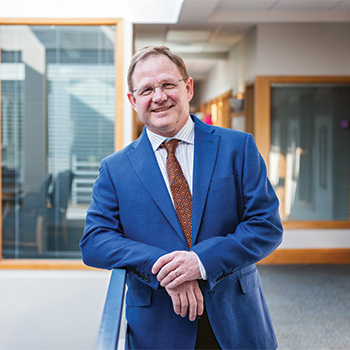
Kurt Snyder, ’91, ’06, had hit rock bottom. He had dropped out of college after just one year of failing every class. He had gone to college to wrestle— but his addiction had gotten the best of him. “My addiction really destroyed something I loved in my life … I loved wrestling, and I remember walking away from it feeling just tremendous regret.”
He was living in San Antonio, far away from his home state of North Dakota. That’s when his brother-in-law reached out to help him find recovery. It was through his brother-in-law’s encouragement that Kurt was able to start going to addiction counseling — counseling that eventually saved his life and helped him overcome his addiction. About a year after that, his brother-in-law died by suicide. “It was really devastating; he was like a brother to me,” Kurt said. “Here’s somebody that saved my life, and I really couldn’t do anything to help him at the time.”
Kurt decided he wanted to go back to college to become an addiction counselor, and at the age of 30, Kurt enrolled at Mary and joined the wrestling team. “My teammates called me ‘gramps,’” he joked.
He didn’t have the best wrestling season — he was hurt all the time, and he didn’t have a winning record — but he showed up every day, he didn’t quit, and he didn’t use drugs or alcohol. At the end of the season, coach Milo Trusty could take 12 people to the national tournament — ten to compete and two alternates. To Kurt’s surprise, Milo chose to bring him as an alternate. He went to nationals with the team, and another guy ended up getting hurt, so he got to wrestle. After losing his first match, Kurt wrestled some of the best he had in his life and ended up winning seven matches in a row to get third place. “I had one good day, and it was that day,” he said with a smile. “It was incredible.”
He didn’t wrestle the next year, but he helped coach the team as he completed his degree in addiction counseling.
“I felt like I was somebody who was thrown away at one time, but then I was given this community at the University of Mary that supported me in incredible ways. Mary gave me more than a chance to redo my college athletic career. I was successful; I was valued. I reclaimed my life,” Kurt said.
After graduating from Mary, he began his career as a licensed addiction counselor, most of it at Heartview Foundation in Bismarck. Eventually, the role of executive director opened, so he went back to Mary for his master’s in management.
Now he helps those struggling with addiction to find recovery like he did. Heartview Foundation is a nonprofit that provides treatment for drug and alcohol addiction. During his twenty years at Heartview, their staff has grown from eight people to 125, yet the need for addiction counseling has grown even faster. “Between April of 2020 and April of 2021, 100,000 Americans died from an opioid overdose. That is more people than the city of Bismarck. That’s a fully loaded jumbo jet crashing every day with no survivors. That’s how many people are battling addiction,” he said.
Kurt and his wife, Lisa, have two boys, Jack and Will. The boys don’t wrestle, but they both enjoy basketball.
“Mary has been there for me at every turn,” Kurt said. “I’m so grateful.”
